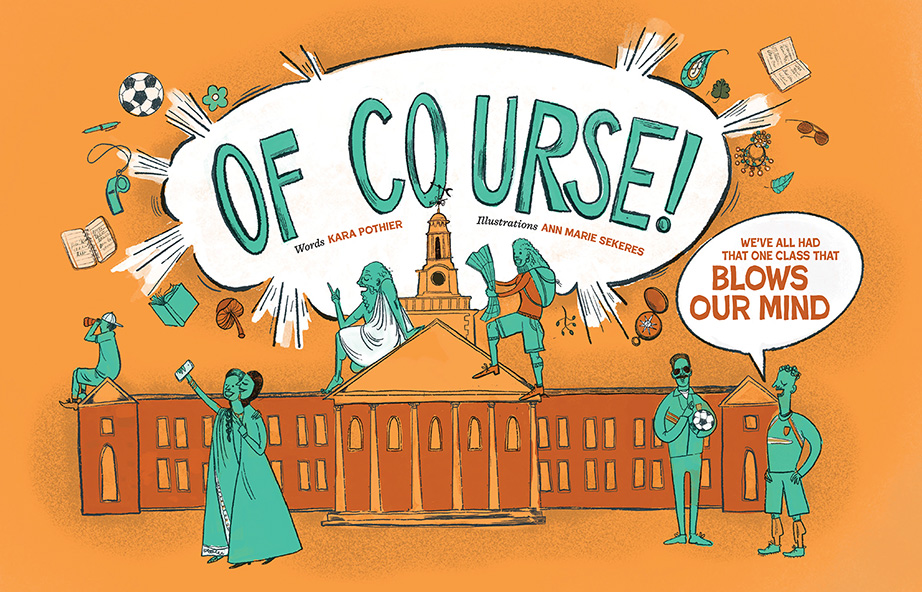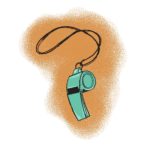Of course!
Check your class schedule. Clever courses abound at TCNJ.

Students enter college with a lot of “Intro to” and “Foundations of” courses. At TCNJ, freshmen also take a seminar or writing course that may be themed around a professor’s passion rather than an academic field. Constance Kartoz, director of the first year seminar program, says these classes are meant to “inspire students to consider how we might meet some of life’s greatest challenges.” We rounded up some favorites here. They may just make you want to go back to college.
Lasso lessons: What Ted Lasso teaches us about life and leadership
 Lindsay Barndt and Erica Kalinowski don’t hide their fangirl enthusiasm for Ted Lasso, the Emmy-winning television series that follows a small-time American college football coach as he is hired to lead a professional English soccer team. In “around the watercooler”-type discussions between friends, Barndt, associate director of co-curricular and leadership development, and Kalinowski, assistant dean of the School of Arts and Communication, marveled at how relatable many of the show’s leadership themes were to their own jobs. “At one point, we just looked at each other and said, ‘What if we taught a class together about leadership through Ted Lasso?’” says Barndt.
Lindsay Barndt and Erica Kalinowski don’t hide their fangirl enthusiasm for Ted Lasso, the Emmy-winning television series that follows a small-time American college football coach as he is hired to lead a professional English soccer team. In “around the watercooler”-type discussions between friends, Barndt, associate director of co-curricular and leadership development, and Kalinowski, assistant dean of the School of Arts and Communication, marveled at how relatable many of the show’s leadership themes were to their own jobs. “At one point, we just looked at each other and said, ‘What if we taught a class together about leadership through Ted Lasso?’” says Barndt.
Now, each week, the two sit down with their students to watch an episode and then talk about the topics — such as group dynamics, growth mindset, empathy, and trust — that emerge from the show.
Some students, like Kat Kalabratzidis ’26, had never seen the show prior to taking the class. She was skeptical because she wasn’t a soccer fan; but the business management major was quick to see the class’s value. “We discuss the deeper meanings behind being a leader, and those are lessons I’ll take with me into my business career,” she says.
Edward LaPadula ’26 was drawn to the class because of his love for sports but admits his favorite assignment — to write a two-minute halftime speech from a coach’s perspective — helped him understand rhetorical analysis.
“I know how to use my voice to motivate people now,” he says.
“It has been an amazing experience to watch the students’ growth from the very beginning of their leadership journeys,” says Kalinowski.
Imprisoned minds: Philosophy and religion from jail
 “It’s the best material from the worst place,” says adjunct philosophy professor Mark Edwards of the works he introduces in Imprisoned Minds, a class about writings from behind bars. “Imprisoned authors have had a profound and inordinate influence on philosophy, religious studies, and political theory,” he says.
“It’s the best material from the worst place,” says adjunct philosophy professor Mark Edwards of the works he introduces in Imprisoned Minds, a class about writings from behind bars. “Imprisoned authors have had a profound and inordinate influence on philosophy, religious studies, and political theory,” he says.
Edwards has taught the course for eight years, and he starts with the story of Socrates, the Greek philosopher who questioned the traditional beliefs in the gods. “The elite Greeks think that they can shut him up by putting him in jail,” he says.
That first day of class is always his favorite. “I remember when I first read Socrates, and just hearing this outrageous punk voice from long ago,” he says. “I repeatedly see his voice having that same effect on the freshmen I teach every year. It’s so much fun.”
Edwards’ course deals with classical questions of philosophy and concerns many of us share: What is the meaning of life? How can I find happiness? And what does it mean to live in freedom?
Students read stories from Hebrew scriptures, the Bible, and medieval political thinkers, as well as the writings of Holocaust survivor Elie Weisel, and activists Angela Davis and Martin Luther King Jr.
“It’s just this potent combination of amazing texts, great students, and the freedom to ask the biggest and hardest questions,” says Edwards.
Peter L. Ricco ’19 took the class in 2014, but recently drew on its lessons as he worked as an emergency room nurse at Duke University Medical Center during the pandemic. “Thoughts of that class got me through a tough and isolating time,” he says. “It helped me find hope.” Ricco wrote to Edwards at the time to let him know it had always been his favorite course.
“This kind of literature holds so much hope, so much power, so much light,” says Edwards. “It’s a chance to let these great voices from history impact and affect these students in whatever futures they pursue.”
East Asian fashion connections
 Students who register for Celia Liu’s East Asian Fashion Connections course may be surprised to see a tea party listed on their syllabus. At the party, Liu, a professor of world languages, encourages everyone to try on a kimono to see how they feel in it. “I like to connect clothing and culture,” says Liu. “It may sound a little like dress-up, but hopefully when my students go out into the world, they will have more appreciation for people from different backgrounds.”
Students who register for Celia Liu’s East Asian Fashion Connections course may be surprised to see a tea party listed on their syllabus. At the party, Liu, a professor of world languages, encourages everyone to try on a kimono to see how they feel in it. “I like to connect clothing and culture,” says Liu. “It may sound a little like dress-up, but hopefully when my students go out into the world, they will have more appreciation for people from different backgrounds.”
Liu, who grew up in Taiwan, has always loved the fashion of the Japanese kimono. She initially developed her course as a way to give Asian American students a sense of pride in their heritage. But the students in her class were diverse, and it morphed into something different. “This class really became more about the connection of clothing to your inner self and how you display your personality and character,” she says.
One assignment asks students to take a photo of themselves in an outfit that makes them feel confident. They then have to write a social media post about how they see themselves in the photo. The students’ gallery of pictures is like a fashion show featuring everything from a traditional Indian salwar kameez to a business power suit to urban techwear.
The class has made an impression on Sanjana Dokiburra ’26. “Professors like Liu are the ones you don’t forget,” she says. Dokiburra also appreciates how a seemingly simple concept like fashion can reveal complex issues.
The class discusses culturally relevant topics such as fast fashion and sustainability, the rise of K-Pop culture, cosplay, and even henna tattoos. Liu ties it all to what she calls the “enclothed cognitive,” meaning the clothes we choose to wear influence our psychological processes and how we feel and behave.
Or, as Liu says, “Fashion has power.”
The last of us: A study of human nature and threats to humankind
 If you ever find yourself stranded in a Lord of the Flies-type situation, Steven Singer has you covered. The special education professor teaches a seminar class on survival that lays a foundation for learning about team building, leadership, and problem-solving.
If you ever find yourself stranded in a Lord of the Flies-type situation, Steven Singer has you covered. The special education professor teaches a seminar class on survival that lays a foundation for learning about team building, leadership, and problem-solving.
The class is organized as an “end of the world” competition where students are divided into teams and given challenges to complete. His students can be spotted out by Lake Sylva collecting kindling to start a fire, lashing poles together with rope to build a suspension bridge, or learning how to filter water.
For Singer, who was a Boy Scout, a paratrooper in the Army’s airborne infantry, and a 46er (he’s hiked to the peak of each of the 46 Adirondacks mountains), outdoor skills have always been a part of his life. “But a lot of youth don’t have the opportunity to develop those skills,” he says. He teaches survival within a context of threats to human sustainability, such as overpopulation, disease, resource depletion, environmental degradation, and war. “We investigate the policies that various nations implement to address or exacerbate these threats,” he says.
Bella Reich ’25 made “no claims to having any survival skills going into the semester,” but it quickly became her favorite class. “College feels like such a place of academic prestige that you expect all your classes to be taught in old buildings with professors who dress in three-piece suits,” she says. “But this shows learning can be fun.” And the takeaways may be even bigger, she says. “These lifesaving skills will stick with me.”
Illustrations: Ann Marie Sekeres
Posted on February 13, 2023

